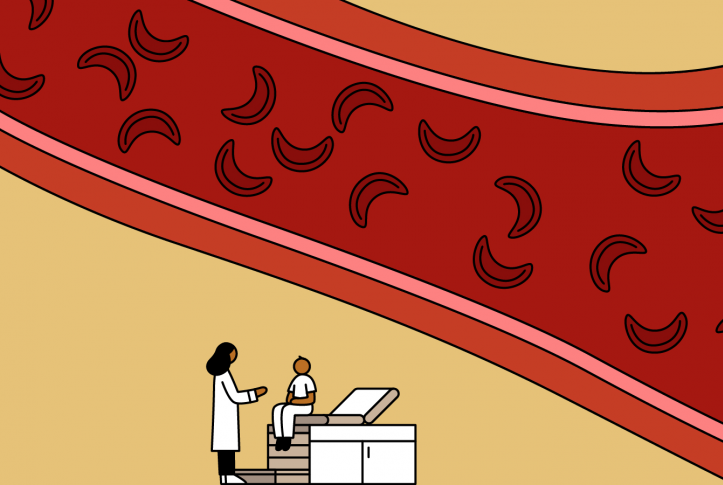A condition of the red blood cells (RBCs) called sickle cell disease (SCD) is inherited. Misshapen RBCs are a consequence of a genetic mutation.
The crescent-shaped RBCs, which resemble a sickle-shaped farm implement, are the source of the SCD moniker. RBCs are often shaped like discs.
Your body’s organs and tissues receive oxygen through RBCs. RBCs struggle to transport enough oxygen when they have SCD. Sickle cells can also lodge themselves in your blood arteries, preventing blood from reaching your organs. This may result in a sickle cell crisis, a painful condition.
A sickle cell crisis often causes pain in the following areas:
- Arms
- Fingers
- Toes
- Chest
- Legs
An acute sickle cell crisis can start off unexpectedly and linger for days. A more serious situation may cause pain that lasts for weeks or months.
A sickle cell crisis may have major problems, such as organ damage and eyesight loss, if it is not treated properly.
An episode of sickle cell crisis: what happens?
Sickled cells can obstruct the flow of blood, they become lodged in a blood artery and cause discomfort. The term “sickling” is occasionally used to describe this.
Reduced oxygen levels, elevated blood acidity, and/or reduced blood volume are all connected with the development of sickling.
The following are frequent causes of sickle cell crisis:
- sudden change in temperature, which can make the blood vessels narrow
- very strenuous or excessive exercise, due to shortage of oxygen
- dehydration, due to low blood volume
- infections
- stress
- high altitudes, due to low oxygen concentrations in the air
- alcohol
- smoking
- pregnancy
- other medical conditions, such as diabetes
How to handle a sickle cell crisis
With the use of over-the-counter painkillers, several sickle cell crises can be controlled, such as; naproxen sodium (Aleve), ibuprofen (Advil, Motrin), and acetaminophen (Tylenol)
Other techniques for dealing with minor discomfort at home include: warming blankets, water intake, warm baths, massages, and rest.
If you have severe pain or home treatments aren’t working, you should see a doctor as soon as possible.
The Doctor will check for any signs of an underlying infection or dehydration that might be triggering the crisis and attempt to determine your pain level. Depending on your pain level, they’ll likely prescribe some medication for relief.
Options for mild to moderate pain include:
- nonsteroidal anti-inflammatory drugs (NSAIDs), such as ibuprofen
- codeine, alone or in combination with acetaminophen (Tylenol)
- oxycodone (Oxaydo, Roxicodone, OxyContin)
Options for more severe pain include:
- morphine (Duramorph)
- hydromorphone (Dilaudid, Exalgo)
- meperidine (Demerol)
Your doctor could also administer intravenous fluids to you in accordance with your symptoms. You could require a blood transfusion if the situation is exceedingly bad.
Are sickle cell crises avoidable?
A sickle cell crisis can’t always be avoided, but some lifestyle adjustments can assist to lower your risk.
Listed below are some methods to lessen your chance of experiencing a sickle cell crisis:
- Take all of your doctor’s prescribed drugs.
- Try to consume around 10 glasses of water each day; if it’s hot outside or you’re exercising, raise that number.
- Avoid anything too rigorous or excessive and stick to light to moderate activity.
- When it’s cold outside, dress warmly and bring an additional layer in case.
- Don’t stay at high elevations for too long.
- Avoid mountain hiking and unpressurized cabin flights (non-commercial) over 10,000 feet.
- To prevent illness, wash your hands frequently.
- Get every immunisation advised, including the flu shot.
- Add folic acid to your diet; your bone marrow requires it to produce new RBCs.
- Take stress management seriously.
- Prevent smoking.
Conclusion
The discomfort of a sickle cell crisis can be excruciating. Although you may manage minor pain at home, more serious pain should be taken seriously and requires medical attention. Severe sickle cell crises can rob the blood and oxygen from vital organs including the kidneys, liver, lungs, and spleen if they are not treated.







